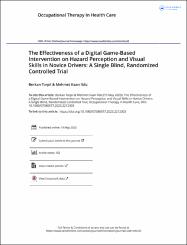The Effectiveness of a Digital Game-Based Intervention on Hazard Perception and Visual Skills in Novice Drivers: A Single Blind, Randomized Controlled Trial
Citation
Torpil, Berkan & Ildiz, Mehmet Kaan. (2023). The Effectiveness of a Digital Game-Based Intervention on Hazard Perception and Visual Skills in Novice Drivers: A Single Blind, Randomized Controlled Trial. Occupational therapy in health care. 1-14. 10.1080/07380577.2023.2212303.Abstract
Novice drivers show poorer performance than experienced drivers in terms of visual skills and hazard perception. This study aimed at evaluating the effectiveness of a digital game-based intervention on hazard perception and visual skills in novice drivers. Forty-six novice drivers (6 men, 40 women) were randomized to the intervention group (n = 23; 20.79 +/- 0.81 years) or control (n = 23; 20.65 +/- 0.93 years) group. The intervention group received a game-based intervention in addition to a hazard perception training, whereas the control group received only the hazard perception training. Hazard perception and visual skills were assessed in both groups before and after the 14-day interventions. Between-group comparisons revealed significantly greater improvements in visual short time memory, visual closure, visual discrimination, figure-ground and total scores in the game-based group than in the control group (p < 0.05 for all). Our results showed that 14 days of game-based intervention enhanced hazard perception and visual skills in novice drivers. Using game-based interventions in driving rehabilitation is recommended to improve hazard perception and visual skills of novice drivers.

















